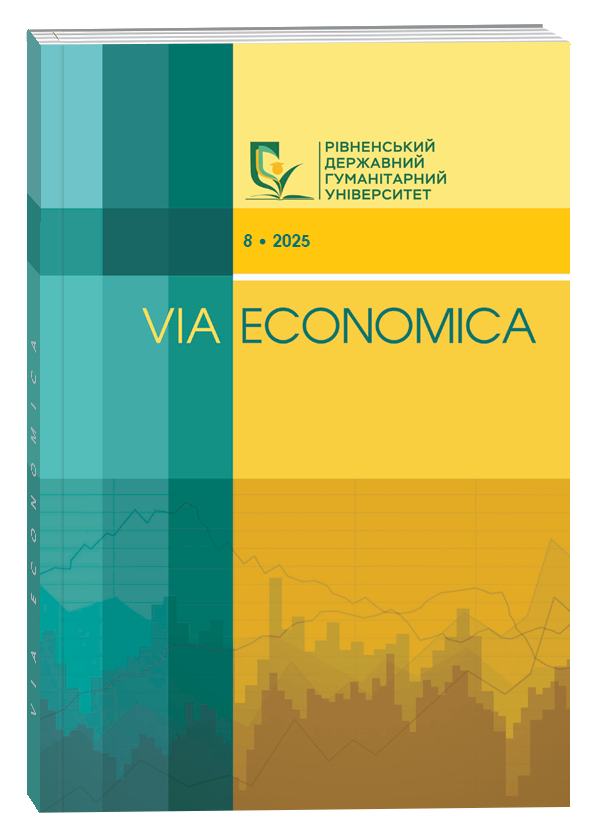BENCHMARKING IN STRATEGIC MARKETING MANAGEMENT OF AN ENTERPRISE: METHODOLOGY, APPROACHES, AND CHALLENGES
Abstract
This paper explores the role of benchmarking as a strategic tool in marketing management for enterprises, particularly in the context of globalization and digital transformation. Benchmarking enables companies to assess their business processes relative to industry leaders, adopt best practices, and enhance their competitive position. The study identifies key types of benchmarking: internal, competitive, functional, and general, each with distinct applications. Special attention is given to the methodological framework of benchmarking analysis, including planning, data collection, analysis, implementation, and performance monitoring. The research examines contemporary benchmarking approaches considering digitalization, artificial intelligence, and big data, which significantly improve strategic decision-making. Practical aspects of benchmarking implementation are analyzed through case studies of leading global corporations such as Amazon, Tesla, and Coca-Cola, which leverage systematic comparisons to enhance operational efficiency and innovation. The paper also explores the potential application of benchmarking for Ukrainian enterprises, particularly in e-commerce, manufacturing, and marketing. The study outlines key barriers to effective benchmarking, including limited market data access, high research costs, and the need for skilled professionals. Recommendations for integrating benchmarking into strategic enterprise management are provided, emphasizing the use of automated analytical platforms, machine learning, and artificial intelligence for competitive analysis. Furthermore, the paper discusses prospects for further research on the integration of benchmarking with marketing risk management, which is crucial in an economically unstable environment. The study also examines the adaptation of benchmarking methodologies to the needs of small and medium-sized enterprises, aiming to optimize marketing processes and ensure sustainable growth. Additionally, the role of artificial intelligence and predictive analytics in benchmarking is analyzed, as these technologies offer enhanced market forecasting, deeper consumer insights, and improved adaptability to changing industry trends.
References
Kotler, P., & Keller, K. L. (2016). Marketing Management. 15-е вид. Boston: Pearson. 832 p.
Porter, M. E. (2008). Competitive Strategy: Techniques for Analyzing Industries and Competitors. New York: Free Press. 397 p.
Camp, R. C. (1989). Benchmarking: The Search for Industry Best Practices that Lead to Superior Performance. Milwaukee: Quality Press. 299 p.
Kaplan, R. S., & Norton, D. P. (1996). The Balanced Scorecard: Translating Strategy into Action. Boston: Harvard Business School Press. 322 p.
Davenport, T. H., & Harris, J. G. (2007). Competing on Analytics: The New Science of Winning. Boston: Harvard Business School Press. 218 p.
Rigby, D., & Bilodeau, B. (2018). Management Tools & Trends 2018. Bain & Company. 40 p.
Barney, J. B. (1991). Firm Resources and Sustained Competitive Advantage. Journal of Management, 17(1), 99–120.
Smith, D., & Jones, A. (2021). Using Big Data in Benchmarking. Journal of Modern Research, 5(3), 45–62.
Jones, B., & Brown, C. (2022). Benchmarking and Corporate Social Responsibility. Economy of the Future, 12(4), 88–99.
Teece, D. J., Pisano, G., & Shuen, A. (1997). Dynamic Capabilities and Strategic Management. Strategic Management Journal, 18(7), 509–533.
Berman, S. J., & Bell, R. (2011). Digital transformation: Creating new business models where digital meets physical. Strategy & Leadership, 39(6), 17–24.
Amazon Inc. (2022). Annual Report 2022. Available at: https://www.amazon.com
Tesla Inc. (2022). Annual Report 2022. Available at: https://www.tesla.com
The Coca-Cola Company. (2022). Sustainability Report 2022. Available at: https://www.coca-colacompany.com
Kotler, P., & Keller, K. L. (2016). Marketing Management (15th ed.). Boston: Pearson.
Porter, M. E. (2008). Competitive Strategy: Techniques for Analyzing Industries and Competitors. New York: Free Press.
Camp, R. C. (1989). Benchmarking: The Search for Industry Best Practices that Lead to Superior Performance. Milwaukee: Quality Press.
Kaplan, R. S., & Norton, D. P. (1996). The Balanced Scorecard: Translating Strategy into Action. Boston: Harvard Business School Press.
Davenport, T. H., & Harris, J. G. (2007). Competing on Analytics: The New Science of Winning. Boston: Harvard Business School Press.
Rigby, D., & Bilodeau, B. (2018). Management Tools & Trends 2018. Bain & Company.
Barney, J. B. (1991). Firm resources and sustained competitive advantage. Journal of Management, 17(1), 99–120.
Smith, D., & Jones, A. (2021). Using big data in benchmarking. Journal of Modern Research, 5(3), 45-62.
Jones, B., & Brown, C. (2022). Benchmarking and corporate social responsibility. Economy of the Future, 12(4), 88–99.
Teece, D. J., Pisano, G., & Shuen, A. (1997). Dynamic capabilities and strategic management. Strategic Management Journal, 18(7), 509–533.
Berman, S. J., & Bell, R. (2011). Digital transformation: Creating new business models were digital meets physical. Strategy & Leadership, 39(6), 17–24.
Amazon Inc. (2022). Annual Report 2022. Available at: https://www.amazon.com
Tesla Inc. (2022). Annual Report 2022. Available at: https://www.tesla.com
The Coca-Cola Company. (2022). Sustainability Report 2022. Available at: https://www.coca-colacompany.com


